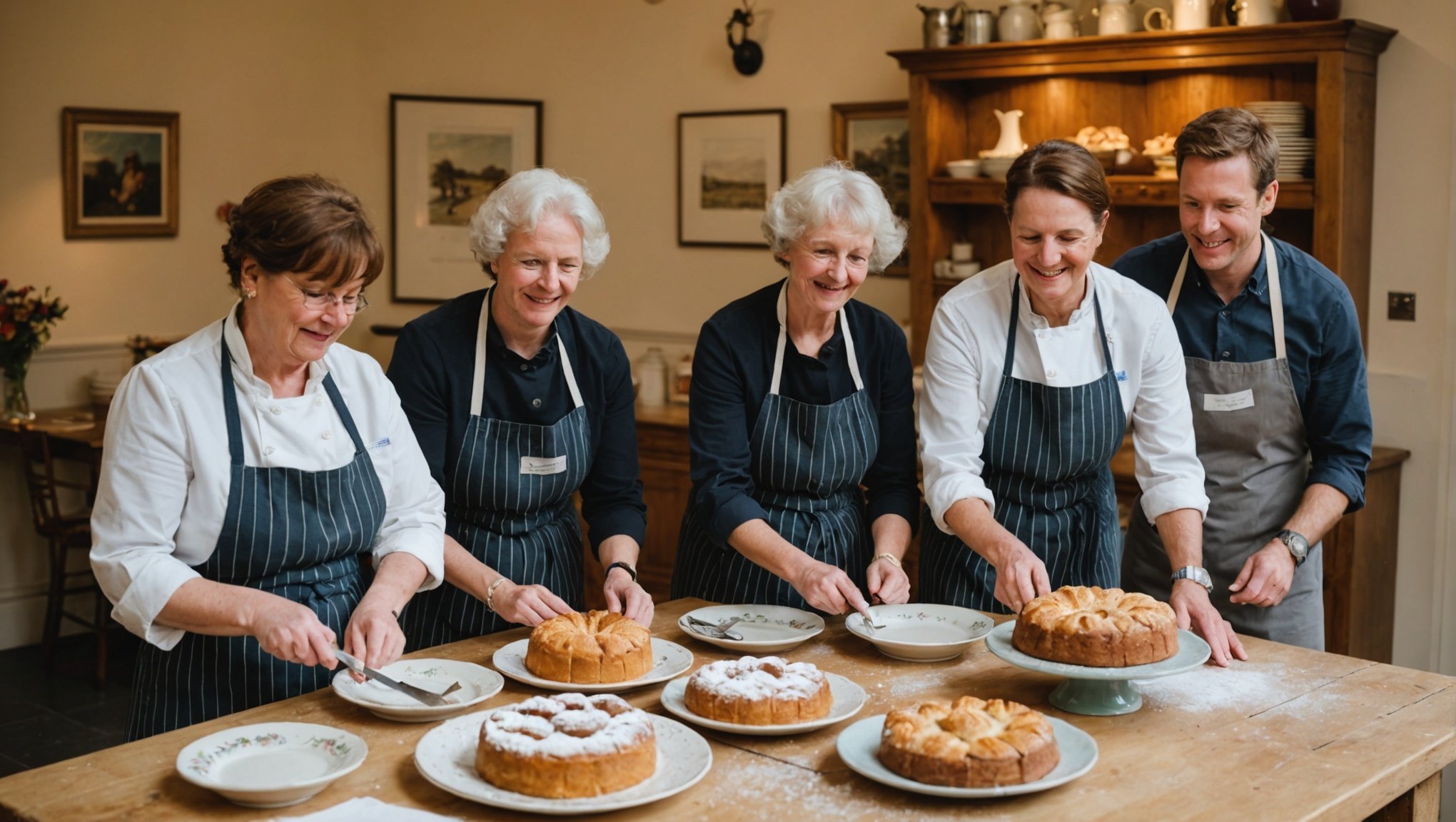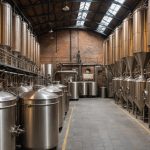Overview of Traditional British Baking Classes
Traditional British baking is an art steeped in history, often characterized by iconic treats such as scones, Victoria sponge cakes, and mince pies. These recipes reflect the cultural heritage of the UK and offer a unique glimpse into its culinary traditions. Baking schools across the country aim to preserve these techniques, making traditional British baking a cherished skill.
The rising popularity of culinary classes is a testament to the growing interest in learning authentic baking techniques. Culinary education has evolved, with many baking schools now offering classes that cater to a wide range of skill levels, from beginners to seasoned bakers. This trend is driven by the desire for personal growth and the satisfaction of creating something delicious from scratch.
This might interest you : The ultimate travel checklist for stress-free adventures
Enrolling in baking classes offers numerous benefits to enthusiasts. Not only do they provide the technical skills needed to master traditional recipes, but they also offer an opportunity to connect with other like-minded individuals who share a passion for baking. Additionally, these classes provide insight into ingredient selection and techniques, ensuring a holistic understanding of the baking process.
Culinary classes focusing on traditional British baking are invaluable for preserving these skills and empowering individuals to create authentic British delicacies. This resurgence emphasizes the value of shared culinary experiences and traditions.
In parallel : Discover the Top Coastal Hiking Trails Across the UK: Your Ultimate Guide to Scenic Walks
Reputable Institutions Offering Baking Classes
For those passionate about honing their baking skills, several baking schools and culinary institutions offer reputable classes that cater to both beginners and advanced bakers. Below are some noteworthy establishments.
School of Artisan Food
Nestled in Nottinghamshire, the School of Artisan Food is renowned for its focus on traditional techniques and sustainable practices. The institution offers a variety of courses ranging from sourdough bread-making to patisserie, catering to diverse interests. With its emphasis on hands-on learning and small class sizes, students receive personalized attention from experienced instructors. This ensures that each learner masters the intricacies of artisan baking.
Leiths School of Food and Wine
The Leiths School of Food and Wine, located in London, prides itself on providing a broad spectrum of cooking courses, including specialized baking classes. Known for its professional diploma in culinary arts, the school also offers short courses for those looking to refine their baking prowess. Its central location makes it accessible, and students benefit from a curriculum that blends classical techniques with modern innovation.
The Cookery School
Situated in the heart of London, The Cookery School offers reputable classes with a mission to make sustainable and delicious baking accessible to all. Their comprehensive baking programs cover everything from basic bread techniques to advanced cake decorating. With a commitment to ethical sourcing and environmental consciousness, the school provides an enriching environment for aspiring bakers.
Course Details and Structure
Understanding the types of baking courses available is crucial for selecting the right fit for your skills and interests. Classes range from beginner sessions focused on basic techniques, like bread-making and pastry mixing, to more advanced workshops that delve into gourmet desserts and intricate cake decoration. Each level offers its own unique curriculum designed to enhance specific skill sets.
Duration and Frequency of Classes
The duration and frequency of these classes can vary, accommodating diverse schedules. Introductory classes might be scheduled for a few hours over a weekend, providing a quick and immersive experience. In contrast, comprehensive courses for serious enthusiasts or future professionals could span several weeks, with sessions held once or twice per week.
Typical Costs and What’s Included in Tuition
When considering the cost of classes, it’s important to assess what is included in the tuition. Prices can vary significantly depending on the institution, location, and course duration. Generally, tuition covers all essential materials like ingredients and instructional booklets. Some institutions also provide tools and equipment, ensuring that students have everything they need to excel in their baking journey. Understanding these aspects helps in making an informed decision that balances budget with educational aspirations.
Insights on Traditional British Recipes
Delving into British baking recipes showcases a unique blend of history and tradition that continues to delight taste buds worldwide. Renowned for their timeless appeal, these recipes offer an opportunity to elevate one’s culinary skills significantly.
Scones and Victoria Sponge
Among the most beloved classic desserts are scones and the Victoria sponge. Scones, often enjoyed with cream and jam, provide a perfect introduction to British baking. They highlight the significance of texture and balance in achieving a delightful crumbly yet moist outcome. Equally iconic, the Victoria sponge requires precision in mixing and baking to create a light, airy cake contrasted by rich cream and jam layers.
Bread Baking Techniques
A mastery of British bread baking techniques is essential for any aspiring baker. From the crusty Cottage Loaf to the soft and chewy Barmbrack, understanding the intricate methods behind dough fermentation and crust formation allows bakers to replicate a range of traditional loaves. Skills such as kneading, proofing, and baking are foundational to creating authentic, flavorful bread.
Pies and Tarts
Pies and tarts represent the culinary skills that marry flavour with presentation in British cuisine. Techniques like shortcrust pastry-making require delicacy and precision. Signature dishes such as steak and kidney pie and treacle tart emphasize a harmonious blend of sweet and savoury, foundational to mastering these classic desserts.
Tips for Choosing the Right Baking Class
Selecting the ideal baking class requires evaluating personal skill levels and goals, ensuring a rewarding learning experience. Start by identifying whether you are a beginner eager to learn the basics or an advanced baker seeking to refine your techniques. Your current abilities will guide you in selecting a class tailored to your needs.
The next step is understanding the class size and instructor expertise. Smaller class sizes allow for personalized attention, whereas larger ones may offer varied group dynamics. Verify the level of expertise and credentials of the instructor. A knowledgeable and experienced instructor can greatly enhance your learning by offering valuable insights and techniques.
Additionally, consider the learning environment and facilities at your disposal. A well-equipped kitchen with adequate baking tools and amenities can make a considerable difference in your hands-on experience. Ensure that the atmosphere is conducive to learning, with ample space and resources for students to practice what they learn.
By carefully assessing these factors, you can align your preferences when selecting a class, ensuring a productive and enjoyable baking experience. Do not hesitate to reach out to institutions with questions or concerns—most will gladly accommodate your inquiries to help you make a decision. Emphasizing these considerations can smoothly guide you in choosing the perfect baking class.
User Reviews and Experiences
When considering whether a class or course is right for you, student reviews and testimonials play a crucial role. Many participants have shared their class experiences, providing insights into what one can expect. By examining these reviews, potential students can gain a more comprehensive understanding of the course dynamics.
A summary of the feedback suggests a mix of opinions. Some students highlight the transformative nature of specific classes, mentioning how their knowledge and skills have significantly improved. Others focus on the collaborative environment, appreciating the opportunity to engage with peers and instructors. These varied experiences across different classes hint at the diverse teaching approaches and subject matter covered.
One testimonial might emphasize the rigour and depth of content, while another could praise the hands-on opportunities provided. These differences truly reflect the broad spectrum of the learning process.
Importance of reviews becomes evident as they serve as an essential resource for aspirants. They assist in decision-making by revealing not only the strengths but also potential areas for improvement within a course. Thus, student reviews act as a guiding light, helping individuals make informed choices about their education path.
Enrollment Process and Additional Resources
Embarking on a baking journey involves several key steps when enrolling in classes. First, prospective students must select their preferred course from the institution’s catalog or website. Once a decision is made, navigate to the registration process section, which typically involves filling out personal details and selecting class slots. Some institutions may require a nominal registration fee, which can be conveniently paid online. After successful registration, confirmation is usually sent via email.
For those eager to deepen their knowledge, numerous avenues for further learning exist. Online platforms offer vast resources, from video tutorials to advanced techniques in specific baking styles. These can be an invaluable adjunct to formal classes. Baking forums and social media groups provide community support and answer specific questions during the learning curve.
For comprehensive understanding, consider exploring baking-related books and magazines that detail various techniques and global baking traditions. Libraries might also offer workshops or panel discussions, ideal for enhancing skills.
Whatever path chosen, these additional resources enrich the learning experience. Engaging with a variety of learning materials not only solidifies basic skills but also inspires creativity and innovation in the kitchen.
















